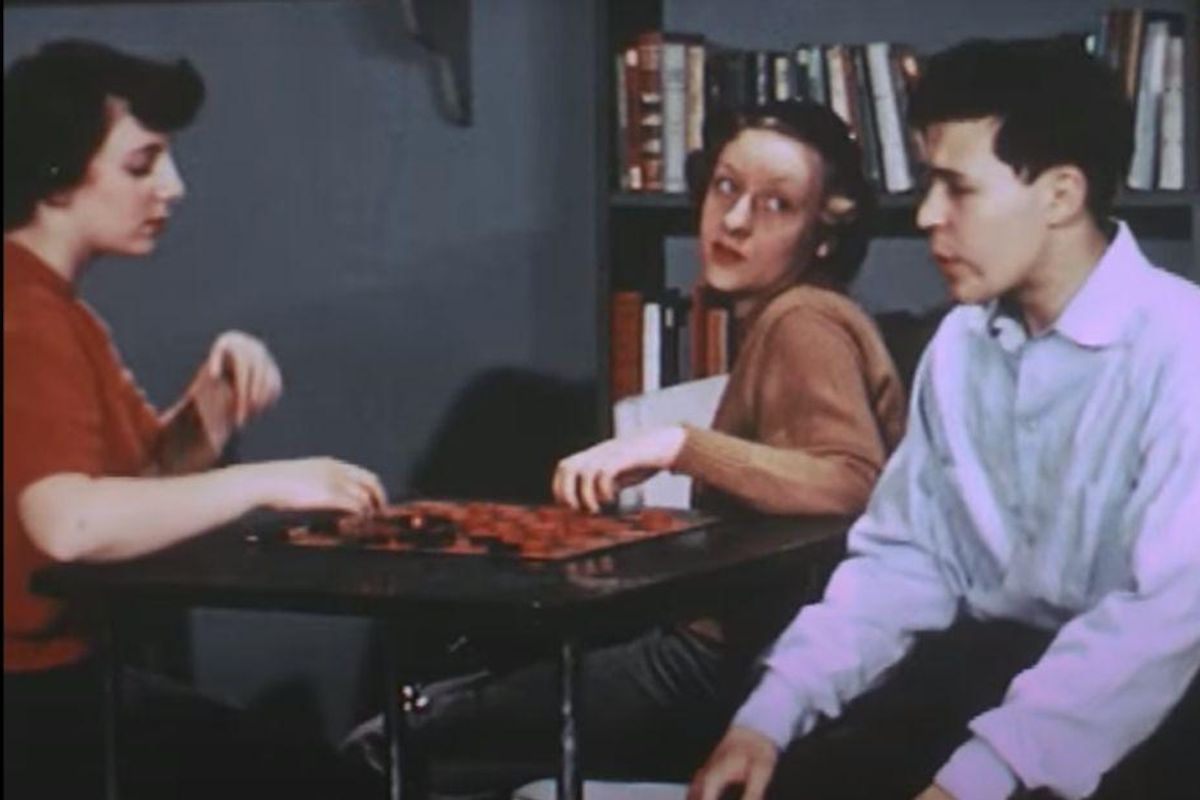Forgot how to talk to people? This 1950 short film on having better conversations might help.
It's so cheesy, but also surprisingly helpful.

Film reel from 1950 contains cheesy but relevant tips for brushing up our pandemic-bruised social skills.
The pandemic hasn't ended, but a combo of a push toward "normalcy" and a window of low case counts has made it so that most of us are venturing out more. Some of us are finding that our social skills have gone a bit wonky. Throughout the pandemic, there have been articles telling us that this was happening, with headlines like "It's not just you. We're all socially awkward now" and "A crash course in polishing your pandemic-damaged social skills." I had a friend the other day mention how he'd met someone new and felt like he'd forgotten how to have a conversation.
In addition to the pandemic, the social and political discourse of the past several years feels like it has become more and more contentious. It's hard to have a discussion in which disagreements don't devolve into ugliness, so we might avoid any conversation that goes beyond the weather altogether.
However, research also shows that people really want to have richer conversations with one another. So we're in this weird spot of wanting to talk to people but feeling a bit lost as to how to do it.
Never fear. The 1950s film reel is here to help us out.
Those of us who grew up in the predigital era remember our teachers trotting out film projectors and showing us crackly films from the '50s with the iconic announcer-y voices and "Aw, gee whiz" teens acting out cheesy scenes. (Some of us hear the clickety-clicking of the projector and immediately want to fall asleep, as our minds revert back to the unbearable boredom—and yet much-needed reprieve from normal class—that such films meant for us.) This film reel will send Gen-X-and-older folks straight back to our childhoods.
But there's actually some good stuff in here. "Ways to Better Conversation" was part of a series of instructional educational videos put out by Coronet in the '40s,' 50s, '60s and '70s. It compares a good conversation to a volleyball game, and examines the roles of courtesy, contributing, following the subject and listening carefully in having a pleasant, productive conversation.
Oddly enough, it's these basics that are often missing from modern conversation, which becomes fairly apparent when we witness the "bad conversation" example in the film. Despite its oh-so-very-1950 vibe, the fundamental lesson really does apply to today.
And if you don't find the tips useful, it's still a delight to see the '50s equivalent of a YouTube how-to video. This is how we used to roll, kids. Watch and learn.
(And yes, the flub with the skipped words at the beginning is actually quite true to the reality of watching these films in class. Something was always breaking with those things. Good times.)
- 5 applause-worthy quotes from Lady Gaga's candid conversation ... ›
- A viral TikTok video explains why interrupting others isn't always as ... ›
- Woman's epic conversation with her printer proves they are ... ›



 Millennial mom struggles to organize her son's room.Image via Canva/fotostorm
Millennial mom struggles to organize her son's room.Image via Canva/fotostorm Boomer grandparents have a video call with grandkids.Image via Canva/Tima Miroshnichenko
Boomer grandparents have a video call with grandkids.Image via Canva/Tima Miroshnichenko

 Worried mother and children during the Great Depression era. Photo by Dorthea Lange via Library of Congress
Worried mother and children during the Great Depression era. Photo by Dorthea Lange via Library of Congress  A mother reflects with her children during the Great Depression. Photo by Dorthea Lange via Library of Congress
A mother reflects with her children during the Great Depression. Photo by Dorthea Lange via Library of Congress  Families on the move suffered enormous hardships during The Great Depression.Photo by Dorthea Lange via Library of Congress
Families on the move suffered enormous hardships during The Great Depression.Photo by Dorthea Lange via Library of Congress
 A couple cooking in the kitchen with a cat sitting on the table beside chopped ingredients.
A couple cooking in the kitchen with a cat sitting on the table beside chopped ingredients.